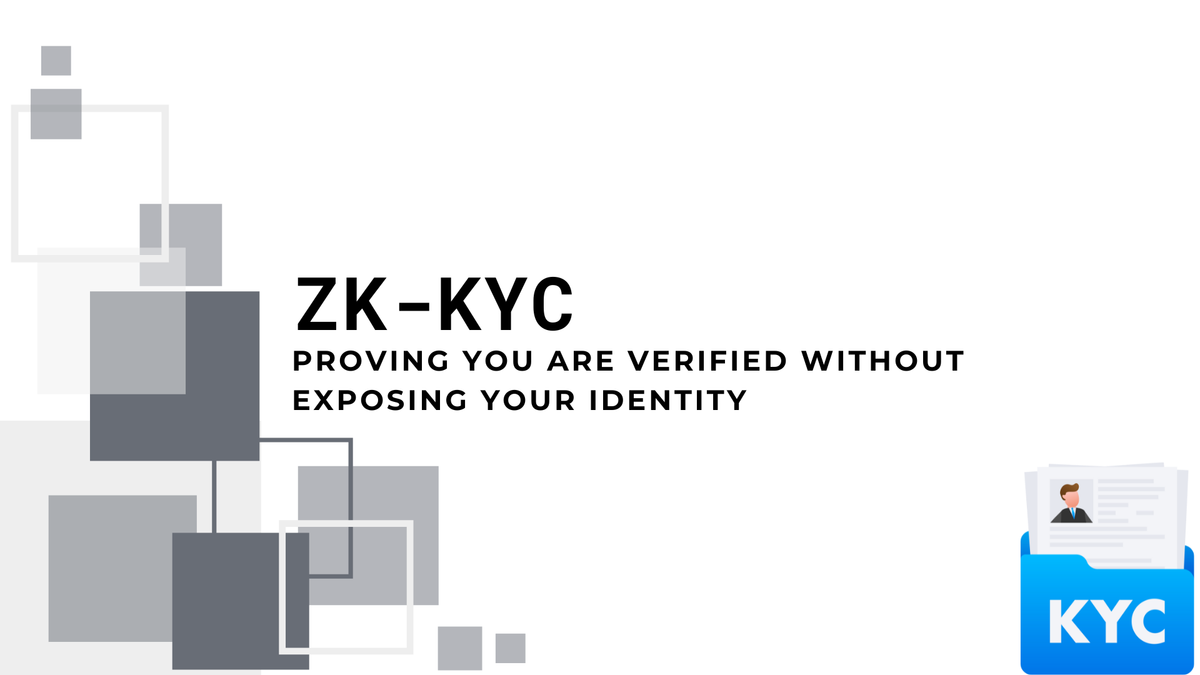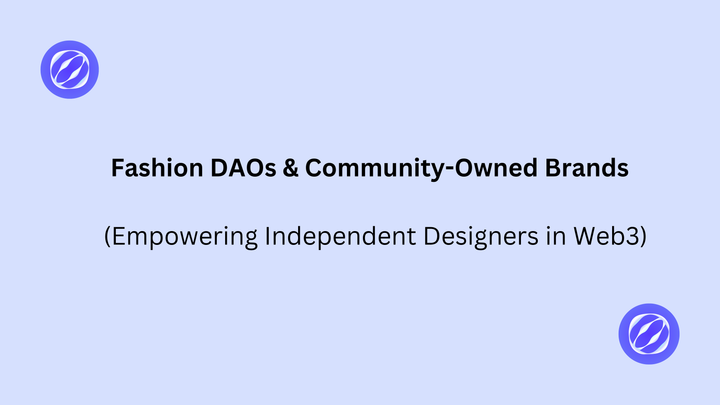ZK-KYC: Proving You Are Verified Without Exposing Your Identity

Introduction
Know Your Customer (KYC) processes are designed to ensure regulatory compliance and prevent financial crimes, but they usually come at the cost of user privacy. Traditional KYC involves sharing personal documents like passports, national IDs, or utility bills, exposing users to identity theft risks and creating data honeypots for hackers.
But what if we could prove someone is verified, without actually revealing their personal information?
ZK-KYC, a privacy-preserving approach to compliance that leverages zero-knowledge proofs (ZKPs) to confirm a user meets certain regulatory requirements without exposing their identity. With projects like Polygon ID, Sismo, and zkPass leading the way, ZK-KYC is poised to revolutionize identity verification in Web3, fintech, and beyond.
What Is ZK-KYC?
ZK-KYC is the concept of performing KYC (Know Your Customer) checks using zero-knowledge proofs, allowing users to prove compliance without sharing raw personal data. The key idea is that someone can prove they belong to a verified group, like “over 18,” “citizen of a country,” or “not on a blacklist”, without revealing the underlying information.
This is done through cryptographic proofs that validate the claim, not the data behind it.
Traditional KYC vs ZK-KYC
| Aspect | Traditional KYC | ZK-KYC |
|---|---|---|
| Data Shared | Full personal info and ID documents | Cryptographic proof of compliance only |
| Privacy | Low | High |
| Data Custody | Centralized storage (banks, exchanges, etc.) | Decentralized or user-controlled |
| Compliance | Centralized verification | On-chain/off-chain verification with attestations |
| Risk | High breach potential | Minimal exposure, more secure |
How It Works: Zero-Knowledge Proofs in Identity
A zero-knowledge proof (ZKP) is a cryptographic method where one party (the prover) can prove to another (the verifier) that they know something, without revealing what that something is.
In the case of identity:
- A user verifies their identity once with a trusted issuer (e.g., government or KYC provider).
- The issuer gives them a verifiable credential (VC), stored in their wallet.
- When needed, the user can generate a ZK proof that proves a specific attribute (like being over 18), without showing the actual credential.
- The platform checks the proof and allows access, ensuring no data leakage.
This paradigm shift enables users to remain anonymous while staying compliant.
Use Cases for ZK-KYC
- Decentralized Exchanges (DEXs): Platforms like Uniswap or dYdX could allow only KYC’d wallets to trade regulated assets, without collecting any personal data.
- DAO Voting: Prove you are a real human or verified community member (e.g., passed a Sybil check) without revealing your identity or wallet activity.
- Token Airdrops & Whitelists: Avoid Sybil attacks by airdropping only to “one-per-person” wallets using ZK-proofed identities.
- Private Web3 Socials: Build social platforms where users can be verified (e.g., university alumni, professionals) without ever revealing their real names or emails.
- Regulated DeFi: Financial apps can offer services to users who meet jurisdictional compliance (e.g., U.S. citizens excluded) via ZK attestations.
Projects Powering ZK-KYC
Let’s explore some of the leading tools in the ZK-KYC space:
1. Polygon ID
Polygon ID uses zk-SNARKs to offer self-sovereign identity for Web3 users. It allows for selective disclosure of credentials and uses BBS+ signatures for attribute-based proofs.
Polygon ID is already being tested for use in community token gating, DAO access control, and decentralized applications.
2. Sismo
Sismo is a privacy-preserving identity protocol using ZK badges. It enables users to prove reputation, group membership, or achievements anonymously.
- Users generate ZK proofs of group membership (like holding a Gitcoin passport or being active on Lens).
- No one sees their full wallet or activity history, just the badge proof.
Use cases include Web3 resume verification, DAO elections, and civil resistance in airdrops.
3. zkPass
zkPass lets users generate off-chain verifiable proofs from Web2 documents (e.g., driver’s license, utility bill, medical records). It’s based on Multi-party Computation (MPC) + ZKPs, enabling compliant access to DeFi without doxxing users.
For example:
- You prove your nationality from your passport on a dApp.
- The platform sees only the proof, not the passport scan or your full details.
4. Verite by Centre Consortium
Though not exclusively ZK-based, Verite is building decentralized identity standards for crypto finance. It integrates with existing credential frameworks and can plug into ZK-proof systems.
Why ZK-KYC Matters
- Reduces Risk of Identity Theft: Users don’t need to send their passports every time they sign up, reducing phishing, hacks, and breaches.
- Compliance Without Surveillance: Financial institutions and dApps can remain compliant with regulators without building Orwellian data vaults.
- Onboarding More Users into Web3: Privacy-preserving identity encourages adoption among users wary of traditional surveillance and data abuse.
- Mitigating Sybil Attacks: One of Web3’s biggest issues is fake or duplicate accounts in gaming systems. ZK-KYC offers human verification without central control.
- Aligns With Global Privacy Laws: Systems like GDPR and Nigeria’s NDPR demand data minimization, and ZK-KYC is built on that principle by default.
Challenges and Limitations
While promising, ZK-KYC is not without hurdles:
- Complex UX: For most users, the concepts of credentials, attestations, and proofs are foreign. Simplified wallets and flows are needed.
- Regulatory Uncertainty: Governments may not immediately accept ZK-based KYC without traditional identification.
- Trusted Issuers: Identity issuers (governments, banks) must participate honestly and cryptographically. Collusion or bias could still occur.
- Interoperability: Multiple standards and protocols may cause fragmentation unless universal frameworks emerge.
Future of Identity: ZK + DID + Web3
The holy trinity of privacy-preserving identity is:
- ZKPs: for private proofs.
- Decentralized Identifiers (DIDs): for user-controlled, verifiable identifiers.
- Verifiable Credentials (VCs): for issuing attestations from trusted sources.
Together, these form a new identity stack where:
- You control your data.
- You share only what’s needed.
- You’re still compliant.
Conclusion: Privacy Meets Compliance
ZK-KYC is more than just a cryptographic novelty; it's a path forward for a more privacy-respecting internet. By allowing people to prove they are compliant without giving up who they are, ZK-KYC solves one of the most critical dilemmas in digital identity and finance.
In a world increasingly demanding both transparency and privacy, ZK-KYC offers the best of both worlds.
Whether you're building a DeFi platform, launching an airdrop, or designing the next Web3 social app, consider the power of ZK-KYC. The future is verifiable, but private.
References
https://eprint.iacr.org/2021/907.pdf
https://www.sismo.io/
https://crypto.com/en/university/beginners-guide-to-zero-knowledge-proofs
https://pexx.com/chaindebrief/polygons-zk-ids-the-solution-to-a-web3-identity/
https://docs.zkpass.org/overview/use-cases/zkkyc
https://www.circle.com/blog/unlocking-decentralized-identity-with-verite
MITOSIS official links:
GLOSSARY
Mitosis University
WEBSITE
X (Formerly Twitter)
DISCORD
DOCS



Comments ()